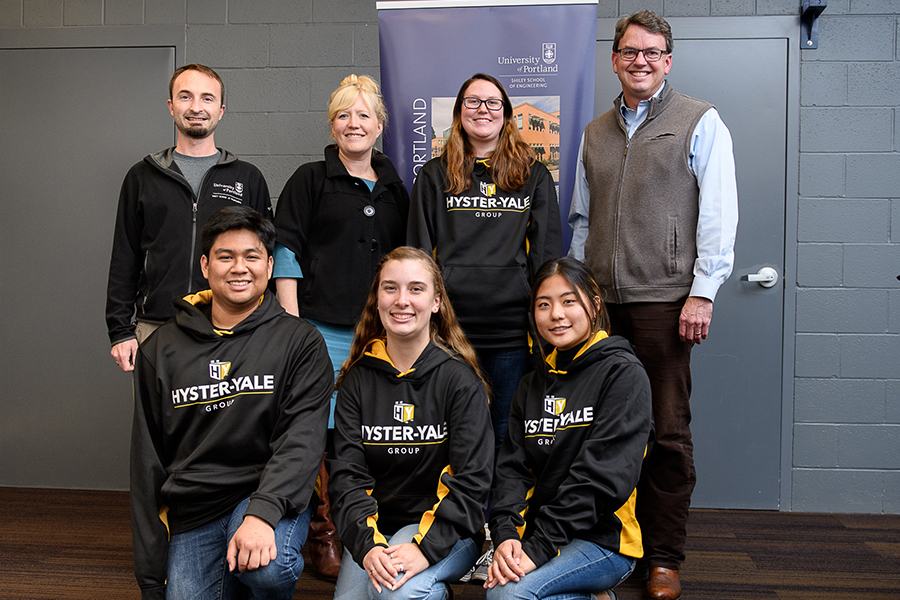
Engineering
April 8, 2019

Tucked in a corner of University of Portland’s physical plant building, you can find innovation leader Edmund Stilwell of Hyster-Yale Group Inc., surrounded by work stations, rolling whiteboards, and student interns who drop in and work on projects as their schedules allow. It’s a bit hard to find at first, but Stilwell hopes the Hyster-Yale Group Innovation Lab will play a big part in the UP’s long-term relationships with industry leaders. And this hope is already starting to be realized. The Shiley School of Engineering has just announced a similar partnership with Tektronix.
The beginnings of this new concept of bringing industry to campus began in 2017 when Hyster-Yale’s Portland development center reached out to Shiley School of Engineering Dean Sharon A. Jones, hoping to open an innovation and product development lab on campus. “She loved the idea,” Stilwell says, “but didn’t think the school had room for us given significant enrollment growth. My company wanted to make it work any way we could, since we know UP engineering graduates are academically strong. She found space for us in a less-frequently used lab and we got started in Spring 2018.”
Using the lab, interns find themselves immersed in the latest practices of innovative product development for emerging markets—discovery skills, questioning, exploration, testing viability, and working within time and money constraints. “Hyster-Yale promotes innovation in a lean way,” Stilwell says. “Fail often, fail fast, it’s okay not to know everything. The important thing is to give students experiences they will face in their careers.”
Stilwell also annually teaches an Introduction to Innovation class in the Hyster-Yale lab. This one-credit course, which is open to all majors, explores new ideas and the culture of innovation in a wide range of situations, stressing benefits of cross-disciplinary discussion, team methods of problem-solving, taking ideas to market, and integrating social mission.
Members of the 2018 class developed a human machine interface for electronic vehicles to indicate how much power was left in the fuel cell. An error code, such as an oil light in cars, would indicate low power. The results were presented to Hyster-Yale’s vice president of product development and marketing staff. “They were impressed by how UP students simplified the design of the product,” says Stilwell. “The end result is a product that is viable and going into production in the future.”
Engineering students have been quick to embrace opportunities made available by the innovation lab. “I’ve been able to apply my knowledge of engineering principles to real world applications,” says Hyster-Yale intern Michaela Sorrentino ’19, “which is helping me become a more well-rounded engineer.” Jeremy Quilizapa ’20 says having the lab on campus is a huge benefit given his busy schedule. “I’ve been able to visit Hyster-Yale’s main office too,” he says. “I’ve met many full-time engineers there, and collaborate with them regularly.”
Now in his second year at University of Portland, Stilwell envisions the Hyster-Yale lab developing into an open innovation area where any company could come in and work to develop products. “Different businesses can help each other learn about new developments and innovations,” he says. “For example, agriculture, construction, and transportation industries can combine ideas and learn from each other’s fields and disciplines.”
This idea of collaboration is what drew Tektronix to also open a product development lab of its own on UP’s campus. Kyle Bernard, principal engineer from Tektronix, sees the benefits from not only an industry perspective but also from that of a student. Bernard graduated with a degree in electrical engineering from UP in 1985 and was able to personally benefit from hands-on learning opportunities.
Innovation and multidisciplinary collaboration are critical drivers for engineering and the University. The University opened the Pilot Space, an interdisciplinary makerspace, in Shiley Hall in fall 2017 after receiving a $25,000 grant from the ESCO Foundation. Students have access to 3D printers, a laser cutter, soldering stations, prototyping materials, and other equipment necessary to rapidly prototype their solutions.
The long-range vision, already underway, is to create an Innovation Center by remodeling an existing physical plant building on campus to support industry partnerships.
We are in a long-term journey with UP,” Stilwell says of the Hyster-Yale program’s future. “We want to grow with our students, creating processes and products that people love.”University of Portland
5000 N. Willamette Blvd.,
Portland, Oregon 97203-5798
503.943.8000
This website uses cookies to track information for analytics purposes. You can view the full University of Portland privacy policy for more information.
